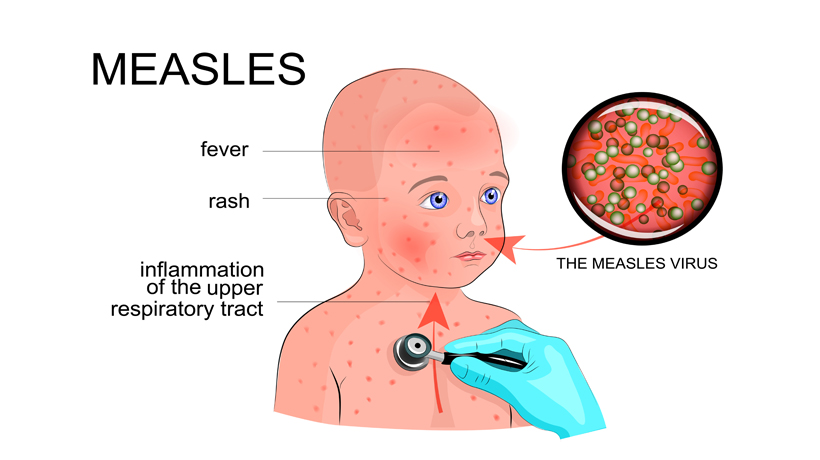Measles is a contagious respiratory infection. It causes a total-body skin rash and flu-like symptoms, according to KidsHealth, a health information website from the nonprofit Nemours. As soon as the virus enters the body, it spreads in the back of the throat, lungs, and the lymphatic system, states the health website Medical News Today. The virus takes about one to three weeks to establish itself, but symptoms appear between nine and 11 days after initial infection. Those who have never had the measles or haven’t been vaccinated are more likely to get sick if they breathe in infected droplets or are in close physical contact with an infected person.
Measles is rare in the United States thanks to widespread immunization, states KidsHealth. But millions of cases still happen worldwide every year. What are the signs and symptoms of the measles that parents should be aware about? What preventive measures can they take?
What is measles?
Measles is caused by a virus, so there is no specific medical treatment for it, states Kids Health. The virus has to do its job. A child who is sick should drink plenty of liquids, get lots of rest, and stay home from school or daycare to prevent spreading the infection.
There are two types of measles, according to Medical News Today,. They are:
- Measles: The standard form caused by the rubeola virus.
- Rubella: This is caused by the rubella virus. Rubella generally presents as mild but presents more of a risk to unborn infants than young children if a woman contracts the virus while she is pregnant. It is neither as infectious nor as severe as standard measles.
Medical News Today says an infection can spread through having physical contact with an infected person, being near infected people if they cough or sneeze, touching a surface that has infected droplets of mucus and then putting fingers into the mouth, or rubbing the nose or eyes.
What are the symptoms?
According to MedicineNet, a health information website owned by WebMD, some of the symptoms are
- dry cough
- conjunctivitis
- runny nose
- high fever
- skin rash
There are also many different measles complications such as ear infections, pneumonia, and encephalitis. Measles infection of the brain can cause convulsions, mental retardation, and even death. Measles in pregnant women can cause miscarriages or premature delivery.
Who is at risk?
According to Medical News Today, people most at risk are patients with a weak immune system, such as those with HIV, AIDS, or leukemia. Other people who have a high risk of contracting measles are people with a vitamin deficiency, very young children, and adults who are unvaccinated. Older people are more likely to have complications than healthy children over the age of 5 years.
Are there preventative measures?
Isolation: According to Mayo Clinic, because the measles is highly contagious, people with measles shouldn’t return to activities in which they interact with other people during this time. It may also be necessary to keep nonimmunized people away from the person who is the infected person.
Vaccination: Mayo Clinic also recommends that anyone who’s at risk of getting the measles who hasn’t been fully vaccinated receives the measles vaccine as soon as possible.
Sources:
https://kidshealth.org/en/parents/measles.html
https://www.medicalnewstoday.com/articles/37135.php
https://www.medicinenet.com/measles_rubeola/article.htm#what_is_measles_what_does_measles_look_like
https://www.mayoclinic.org/diseases-conditions/measles/symptoms-causes/syc-20374857
This article is for informative purposes only. Please reach out to a medical professional if you have any symptoms.



